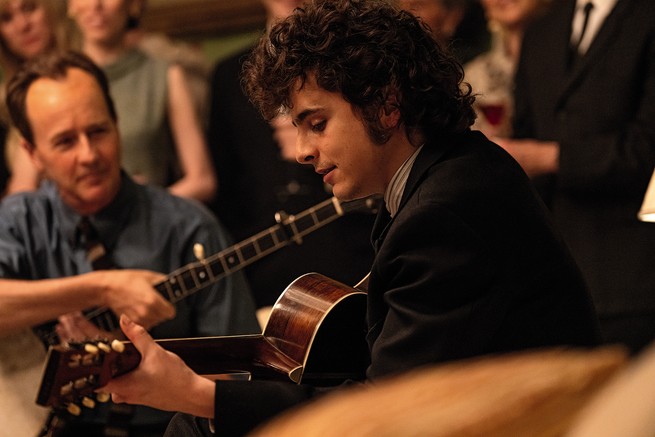Bob Dylan’s Carnival Act
6 min read
Everything, as Charles Péguy said, begins in mysticism and ends in politics. Except if you’re Bob Dylan. If you’re Bob Dylan, you start political and go mystical. You start as an apprentice hobo scuffing out songs of change; you become, under protest, the ordained and prophetic mouthpiece for a sense of mass disturbance otherwise known as the ’60s; and then, after some violent gestures and severances, you withdraw. You dematerialize; you drop it all, and you drift into the recesses of the Self. Where you remain, until they give you a Nobel Prize.
James Mangold’s A Complete Unknown, like all the best movies about rock stars—Sid and Nancy, Bohemian Rhapsody, Control—is a fairy tale. It takes liberties: Dylanologists will scream. It dramatizes, mythicizes, elides, elasticizes, and tosses twinkling magic showbiz confetti over the period between Dylan’s absolutely unheralded arrival in New York in 1961 and his honking, abrasive, ain’t-gonna-work-on-Maggie’s-farm-no-more headlining appearance, four years later, at the Newport Folk Festival, where his new electric sound drove the old folkies berserk and the crowd (at least in Mangold’s movie) bayed for his blood.
Timothée Chalamet plays Dylan, and he does it very well, with a kind of amnesiac intensity: He mooches, twitches, mumbles, makes things up, as if the young Robert Zimmerman, in the ferocity of his effort to shed his history and become Bob Dylan, has temporarily cauterized his own personality. Ed Norton, his high forehead glowing with benevolence, plays Pete Seeger, the folk-activist father figure whom Dylan will betray. Scoot McNairy, in an amazing wordless performance, plays Woody Guthrie, immobilized by Huntington’s disease at the Greystone Park Psychiatric Hospital, in New Jersey. Dylan makes a pilgrimage to Greystone with his guitar and fumbles through a beautiful, uncanny bedside version of “Song to Woody”:
Hey, hey, Woody Guthrie, I wrote you a song
’Bout a funny ol’ world that’s a-comin’ along
Seems sick an’ it’s hungry, it’s tired an’ it’s torn
It looks like it’s a-dyin’ an’ it’s hardly been born
How did he do that? How did this nobody from nowhere, at the age of 20, contrive to sound simultaneously like the creaky religious past and the howling incoming future? It wasn’t his musicianship: As a guitarist, he was stumpy and street-level, and his god-awful harmonica playing now sounds like a kind of comic punctuation, the harmonica less a musical instrument than a place to put his face after delivering an especially jagged line. But his young-old voice, with its swoops and smears and its relentless edge, was a vehicle for cutting through: The world would have to wait for John Lydon of the Sex Pistols to hear another voice so crystallized with frozen wrath.
And when his words, or his visions, reached the pitch of nightmare—I saw a room full of men with their hammers a-bleeding—he sounded not scared but aroused, as if by imminent and gleeful vindication. The musician Robyn Hitchcock, listening to Dylan while pent up in an English boarding school, felt the full revelation. As he describes it in his recent memoir, 1967, Dylan seemed “to have accessed (or created?) a world outside morality, faith, rules or superstition: [he’d] found the sad, doomed kingdom where things simply are—for no apparent purpose—and whose denizens haplessly await their fate.”
One of the young Dylan’s foundational fibs, as he skulked and sputtered around Greenwich Village, was that he had learned his songcraft while traveling with a carnival. This is important, because I’ve begun to suspect that a major division in American life, perhaps the major division, is the one between carnies and non-carnies; that is, between those who understand instinctively—animalistically, sometimes—that life is theater, that people will believe what they want to, and that all the most essential things happen in the imagination, and … everyone else. Carnies don’t have much respect for reality, because they know they can bend it and knock it around. Non-carnies are condemned to the facts—to what Stanley Elkin called the “plodding sequiturs.”
Was young Bob a carny? He wanted to be, and compared with the courageous and sweetly high-minded Seeger, he certainly was. His identity was a performance. His writing was sleight of hand. He wowed and bamboozled his own audience. And when, in A Complete Unknown, he tries out the carnival story on Joan Baez (played by Monica Barbaro), embroidering it freshly with the addition of a cowboy guitar player called Wigglefoot, she looks at him and says—thrillingly deadpan—“You are so completely full of shit.” Which is exactly what you say to a carny.

And it was all very theatrical, very over-the-top, the way they lauded him and garlanded him and made him the Voice of a Generation. (Don’t all those contemporary cover versions of his songs—with the exception of Hendrix’s smoking “All Along the Watchtower”—now sound like misunderstandings, mistranslations?) The earnestness and humorlessness of the folkies was unbelievable. He had come to save us all. The line would be unbroken: From Woody Guthrie to Bob Dylan, the torch had been passed.
Except that, if you were Bob Dylan, there was no torch, and no one to pass it to, anyway. So he had to be perverse and disruptive and ungrateful and electrified, and make a noise that would horrify poor old Seeger: punk rock avant la lettre. A Complete Unknown makes an especial villain out of Alan Lomax, which is interesting: The venerable activist-archivist becomes, in the movie, a thuggish folk enforcer, cursing Dylan for his impurity and tussling with his manager Albert Grossman during the set at Newport.
It’s in the Newport scenes, with the crowd roaring in distress, that the movie really does some fancy shuffling of events. History records that Lomax did actually brawl with Grossman. But no one at Newport shouted “Judas!” at Bob Dylan: That wouldn’t happen until the following year, when he played the Free Trade Hall, in Manchester, England. And Ian Bell, in his Once Upon a Time: The Lives of Bob Dylan, makes the point that most of the festivalgoers at Newport—a hip audience, after all—would have known what to expect from Dylan that day: “ ‘Maggie’s Farm,’ supposedly the main cause of all the Newport trouble, is neither a secret nor a surprise to anyone with the slightest interest in Dylan by the time the festival begins.” (Dylan’s keyboardist Al Kooper has said that “85 to 90 percent” of the crowd was enjoying the Dylan performance.)
But so what? A Complete Unknown is a movie, and a movie—or a movie like this, which in one sense is a parable of artistic ruthlessness—needs a climax. And Bob Dylan, more than most rock stars, is a myth. In all senses of the word. He made himself up, he disappeared himself, and in doing so, he became a lens: Rays of otherworldly insight poured through him, and he trained them upon us like somebody frying ants with a magnifying glass.
He had shimmering visions and torture chambers in his mind; he could make God and Abraham talk with each other like two hustlers on a street corner; he let everybody down, ditched everybody, and then taught them how to be exhilarated by that abandonment. Something in me wants to talk about the hard rain that is falling right now, and to wonder who will step up to sing about it: who will be our minstrel of the End Times; our guiding, undeceivable voice; and so on. But to ask that kind of question—to think in those terms—is to lapse into the great mistake, isn’t it? And here endeth the lesson of Bob Dylan.
This article appears in the January 2025 print edition with the headline “Bob Dylan’s Carnival Act.” When you buy a book using a link on this page, we receive a commission. Thank you for supporting The Atlantic.




